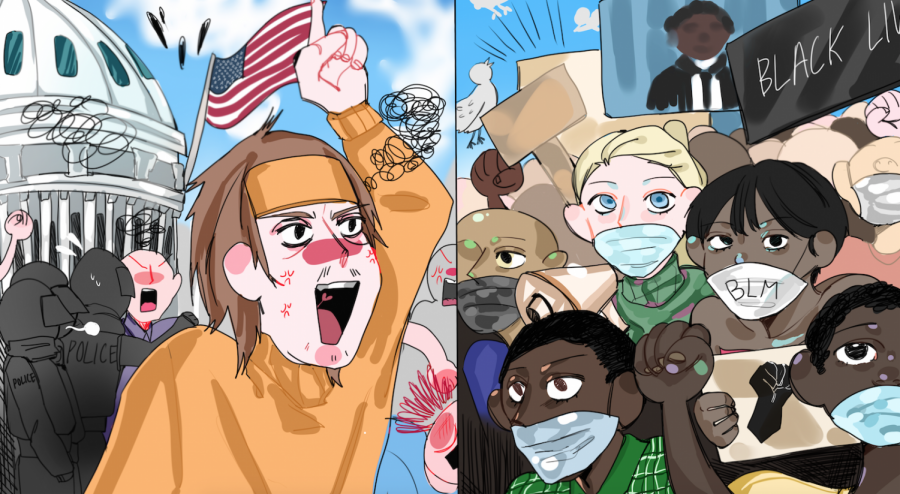America starts the New Year divided as ever
February 12, 2021
The thread that binds America has been unraveling for the last several decades, with trust in national institutions crumbling and political, cultural and economic gaps reaching record levels.
Earlier this month, the country watched in horror as a violent mob forced their way into the Capitol to disrupt lawmakers from ratifying the electoral vote for then President-elect Joe Biden, leading to the deaths of a police officer and four others. If Covid-19, a powerful and deadly enemy to all, couldn’t manage to unite us, what, if anything, will?
The increasingly prevalent ideological divisiveness, which is projected to increase in the coming months, is not only disheartening but outright dangerous, as it cripples our response to the virus. It also means we can expect more demonstrations, maybe even more violence, from extremists and conspiracy theorists.
Disagreements have moved beyond abortion, climate change and gun control to stark difference in how people perceive reality. “The election was stolen” is a poison that has entered the American political bloodstream, driving more extremist beliefs and becoming an obstacle to recovery.
A catastrophic 2020 brought about many repercussions to the nation, a few of which involved an impeachment, a global pandemic, racial reckoning, economic hardship and a campaign unlike any other in memory. Now in 2021, with an unprecedented domestic attack striking the U.S. Capitol on Jan. 6, the task of bringing together our country fell to Biden, who ran on a platform of national unity and healing.
President Biden has said his first 100 days in office will be spent combating Covid-19, reversing immigration policies put in place under former President Donald Trump and addressing criminal justice reform. Even though Biden will face Republicans in the Senate who will push back on most of his initiatives, making even incremental progress on these pressing issues would be a win.
Still, both sides should agree the top priority is tackling the pandemic.
Americans are anxious for unified, strong leadership to put Covid-19 behind us and in our rearview mirror. More than half of the country personally knows someone who has been hospitalized or has passed due to the virus.
Ideally, our response should be a unified effort by all Americans. After all, we all have the same goal—to rid ourselves of the virus, minimize lives lost and prop our economy back up so that people’s livelihoods are not further deteriorated.
“Bad Covid policy, distorted by partisanship, has cost lives and jobs,” reported Johnathan Rockwell and Christos Makridis of the Brookings Institute in their September analysis paper, “Politics is wrecking America’s pandemic response.”
Rockwell and Makridis argue that legislators are ineffective at providing an appropriate response because they prioritize loyalty of party over the well-being of Americans.
They also blame certain media outlets with significant political leanings, such as Fox News, for downplaying the virus. That, of course, deterred many people from taking proper precautions.
So, clearly, hyperpartisanship is damaging American politics by needlessly contributing to senseless deaths and to the rise in poverty and unemployment due to economic distress.
With Biden’s victory over Trump, this great political divide proved deadly. Trump’s supporters, claiming a rigged election, took to the streets and to the Capitol to express their concern over the results, with no plans of stopping soon. Polarization is real and growing rapidly in America, with both sides viewing the other as a threat to the security of the nation.
There is, however, hope to change this worrisome trend. If we as Americans can learn to think outside of party lines and focus on bipartisan policies that a large majority of us support—such as stimulus checks and affordable healthcare—we can start to realize that we all are on the same team and begin to heal as a nation.
Abraham Lincoln famously proclaimed that a house divided against itself cannot stand.
If America wishes to keep standing, the issue of political divisiveness should be one of the first and more important issues addressed.










